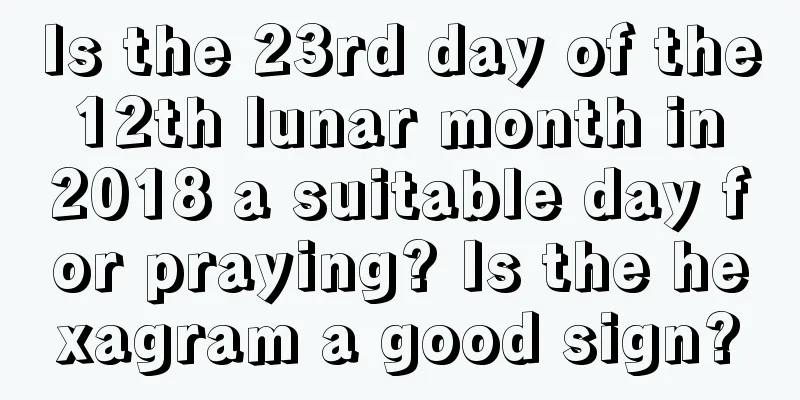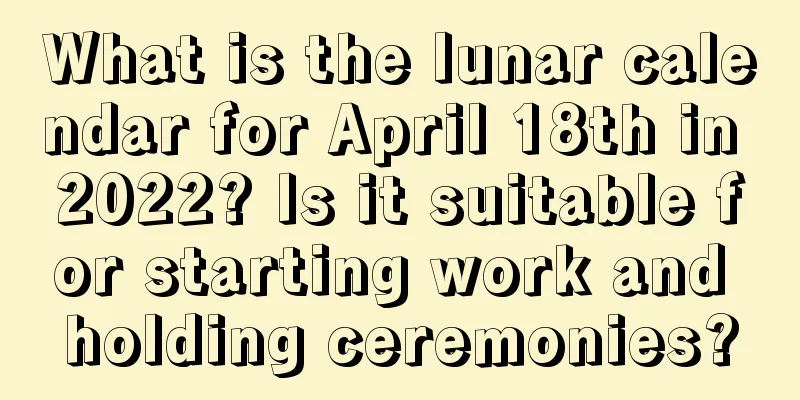What festivals are there in the twelfth month of the lunar calendar in 2020? What are the festival customs?

Introduction: The twelfth lunar month is the last month of the year in the lunar calendar, and there will be many festivals in the twelfth lunar month. So [What festivals and customs are there in the twelfth lunar month of 2020] Follow the editor to find out! "The eighth day of this month is called Laba in temples. Large temples and other places all prepare five-flavor porridge, which is called Laba porridge." Mr. Shui Mo will take you to understand every day of the twelfth lunar month in 2020.What festivals are there in the twelfth lunar month of 2020?According to the old almanac, the festivals in the twelfth month of the lunar calendar in 2020 include Laba Festival (the eighth day of the twelfth lunar month), Little New Year (the twenty-third day of the twelfth lunar month), and New Year's Eve (the thirtieth day of the twelfth lunar month).Meaning of Laba Festival: Laba Festival, a traditional Chinese festival, commonly known as "Laba", is held on the eighth day of the twelfth lunar month every year. It is mainly popular in northern my country. The custom of this festival is "drinking Laba porridge". Laba is one of the grand festivals in Buddhism. This day is the day when Buddha Shakyamuni attained enlightenment. It is also known as the "Dharma Treasure Festival", "Buddha's Enlightenment Festival", and "Enlightenment Conference". The word "Laba" originated from the Southern and Northern Dynasties, when it was also called "La Day". It was originally a Buddhist festival, but after generations of evolution, it gradually became a household folk festival. The meaning of Xiaonian: Xiaonian does not refer to a specific day. Due to local customs, the days called "Xiaonian" are also different. The main folk activities during the Little New Year include sweeping the house and offering sacrifices to the kitchen god. The traditional folk festival of the Little New Year (the day for cleaning the house and worshiping the kitchen god) is on the 24th day of the twelfth lunar month. In most parts of the south, the ancient tradition of celebrating the Little New Year on the 24th day of the twelfth lunar month is still maintained. Starting from the middle and late Qing Dynasty, the imperial family held a ceremony to worship the heaven on the 23rd day of the twelfth lunar month. In order to "save money", they also worshipped the Kitchen God. Therefore, the people in the northern region followed suit and celebrated the Little New Year one day earlier on the 23rd day of the twelfth lunar month. Meaning of New Year's Eve: New Year's Eve is the last night of the year. The last day of the year is called "New Year's Eve", which means that the old year ends here and the new year begins. "Chu" means to remove; "xi" refers to night. "New Year's Eve" means New Year's Eve, also known as New Year's Eve, New Year's Eve, New Year's Eve, etc. It is the last night of the year. New Year's Eve is a day for getting rid of the old and welcoming the new, reuniting with the family, and worshiping ancestors. It is a traditional festival for ancestor worship in Chinese folk culture, along with Qingming Festival, Mid-Autumn Festival, and Double Ninth Festival. New Year's Eve has special significance in the hearts of Chinese people. It is the most important day at the end of the year. No matter how far away a wanderer is, he will rush home to reunite with his family, bid farewell to the old year with the sound of firecrackers and welcome the new year with fireworks in the sky. Analysis of festival customs in the twelfth month of the lunar calendar——Laba Festival customs:Drinking Laba Porridge <br /> In ancient times, on the eighth day of the twelfth lunar month, there was a custom among Chinese people to drink "Laba Porridge" or eat "Laba Rice". According to ancient texts, in "Yanjing Sui Shi Ji•Laba Congee" by Fu Cha Dun Chong, "Laba Congee is made with yellow rice, white rice, glutinous rice, millet, water chestnut rice, chestnut, red cowpea, peeled jujube paste, etc., boiled with water, and then dyed with red peach kernels, almonds, melon seeds, peanuts, hazelnuts, pine nuts, white sugar, brown sugar, and grapes for coloring." Worshiping ancestors and gods <br /> Laba Festival is on the eighth day of the twelfth lunar month. In ancient times, Laba Festival was a sacrificial ceremony to celebrate the harvest and thank ancestors and gods. In addition to worshiping ancestors and gods, the eighth day of the twelfth lunar month is regarded by the Buddhist community as the Buddha's enlightenment day. Therefore, temples hold commemorative ceremonies and cook porridge with eight kinds of food, such as glutinous rice, sesame, coix seed, longan, red dates, mushrooms, and lotus seeds, to offer to the Buddha. They also invite people from the surrounding mountains to take the holy communion and give food to the young and old in the houses to share, as a sign of respect for the Buddha. ——Little New Year customs: Eating sugar melons during the worship of the kitchen god "On the twenty-third day of the twelfth lunar month, Kitchen God goes to heaven with a piece of candy in his mouth. He doesn't need to speak a word in front of the Jade Emperor. He comes back to our home to celebrate the New Year, with rice, noodles and clothes to wear." This is a folk song, which is about worshiping the Kitchen God and expresses the yearning for a better life. In the past, people would offer sugar melons to the Kitchen God during the Kitchen God worship ceremony. Sugar melon is a kind of sugar made from maltose, which is very sweet. People also hoped that after eating it, the Kitchen God would have a sweeter mouth and would say more good things when reporting to the Jade Emperor. But after all, the Kitchen God is not a human being, so he cannot actually eat candy, and the candy melon finally falls into the child's mouth. Pasting the Kitchen God's portrait <br /> Sacrificing to the Kitchen God is actually the most important activity on the day of Little New Year. In addition to offering sugar melons and cakes, the Kitchen God's portrait must also be replaced. While taking down the old image of the Kitchen God, every household also has to "invite" back a new one. Sweeping the dust <br /> Sweeping the dust actually means cleaning the household environment. People in the north call it "sweeping the house"; people in the south call it "dusting". Traditionally, every household gets up at dawn on this day to sweep the house, clean the windows, wash clothes, scrub the pots and pans, and carry out a thorough cleaning. According to "Shiyi Ji", this custom can be traced back to more than 3,000 years ago. At that time, it was a religious ceremony to drive away plague ghosts and pray for health. The latter word "chen" is homophonic with "chen", so sweeping the dust means sweeping away all the old things, which refers to both the old dirt in the courtyard and the unpleasantness encountered in the old year. Cutting paper-cuts <br /> Cutting paper-cuts is the most popular folk activity. The contents include various stories about animals and plants, such as magpies climbing on plum trees, swallows flying through peach and willow trees, peacocks playing with peonies, lions rolling embroidered balls, three sheep (yang) bringing good luck, two dragons playing with pearls, deer, cranes, tung trees and toon trees (six harmonies in spring), five bats (blessings) holding longevity, rhinoceros looking at the moon, lotus (continuous) years with fish (yu), mandarin ducks playing in the water, Liu Hai playing with golden cicadas, the two immortals of harmony and unity, etc. Pasting window decorations means that the new year will be better and better. Bathing and Wedding <br /> On the day of Little New Year, both adults and children have to bathe and have their hair cut. There is a saying among the people that "Whether you have money or not, you should get a haircut during the New Year." After the 23rd, people believe that the gods have gone to heaven and there are no taboos. There is no need to choose a date to marry a wife or a daughter, which is called a hasty marriage. There are a lot of wedding ceremonies held until the end of the year. There is a saying in the folk song, "At the end of the year, villages are busy with weddings, and Yichun’s invitations are sent to celebrate the spring. Sisters whisper to each other in front of the lamp, and this year’s staying up late is the bridal chamber." ——New Year's Eve customs:New Year's Eve Dinner <br /> The New Year's Eve dinner is also called the reunion dinner. According to the records in "Jingchu Sui Shi Ji" by Zong Yan, the custom of eating New Year's Eve dinner has existed at least since the Southern and Northern Dynasties. Because it is winter, people in the north often set up a hot pot in the middle of the dining table, so it is also called "weilu".Posting Spring Festival Couplets<br /> Spring Festival Couplets, also known as "door couplets", "spring stickers", "couplets", and "couplets", are a type of couplets and a unique literary form. This pair of the world's earliest Spring Festival couplets, "The three yangs begin to spread, the four seasons begin to open", is recorded on the Dunhuang manuscripts unearthed from the Mogao Grottoes. The couplet was written by Liu Qiuzi of the Tang Dynasty in the 11th year of Kaiyuan (723). The custom of pasting Spring Festival couplets during the Spring Festival began to become popular among the people in the Ming Dynasty, and the trend originated in Nanjing. Nowadays, people in the Jiangnan region pay attention to pasting Spring Festival couplets on the morning of New Year's Eve. Pasting the word "Fu" <br /> Pasting the word "Fu" during the Spring Festival is a long-standing custom among the Chinese people. Pasting the word "Fu" during the Spring Festival reflects people's yearning for a happy life and is also a wish for a better future. Staying up all night <br /> The custom of staying up all night to celebrate the New Year has a history of nearly two thousand years in China. Zhou Chu of the Jin Dynasty talked about the New Year customs in Shu in his "Fengtu Ji". At the end of the year, people gave each other New Year gifts, which was called "gifting the year"; they invited each other to banquets, which was called "saying goodbye to the year"; and they stayed up all night on New Year's Eve, which was called "keeping the year". This is the earliest record of the custom of staying up all night to see on New Year's Eve. But at that time, staying up all night to celebrate the New Year seemed to be a local custom. After the Sui and Tang Dynasties, staying up all night to celebrate the New Year became a common custom throughout the country. The eight characters not only affect your fortune, but also have a clear direction for your marriage. If you want to predict whether your marriage is happy, you can click on the "Premium Calculation" below to predict in advance. I wish you a happy life! |
<<: Is December 28th of the lunar calendar in 2020 suitable for moving?
Recommend
Is the 29th day of the sixth lunar month in 2017 a good day for travel?
Introduction: With the improvement and development...
Can I go back to my parents’ home for the Dragon Boat Festival? Can I sleep with my husband?
There are different things to note for every tradi...
Is the 27th day of the second lunar month in 2017 a suitable date for marriage?
Introduction: Getting married is a major event in ...
Is the eighth day of the sixth lunar month in 2019 an auspicious day for repairing graves? Is it a good day to repair graves?
Introduction: Repairing a grave is an important ma...
Is the ninth day of the eighth lunar month in 2021 an auspicious day? Can we get engaged?
Engagement also requires choosing a time, so let’s...
What are the do's and don'ts on the seventh day of the sixth lunar month in 2021? Is it suitable for renovation and construction?
The entire month of June in the lunar calendar of ...
How to write on the Ghost Festival baggage in July 15, 2019? What should be paid attention to when writing on the Ghost Festival baggage?
Introduction: The Ghost Festival is a day to worsh...
Can I get engaged on the Autumnal Equinox in 2018? What should I prepare for the engagement?
During the Autumnal Equinox, a time of agricultura...
Can I get engaged or get a marriage certificate on the tenth day of the first lunar month in 2019?
Engagement was also called "Wen Ding" in...
What kind of care do the elderly need on the Double Ninth Festival?
Introduction: In late autumn, the weather turns co...
Is the 20th day of the first lunar month in 2022 a holiday? Can I get a haircut on this day?
The first month of the lunar calendar is also know...
Is it a good time to get a haircut on June 26, 2020? What zodiac sign is in conflict with August 15?
Introduction: Since every day has its own preferen...
Is the sixth day of the eleventh lunar month in 2017 suitable for funerals?
Introduction: People have to face death throughout...
Is May 27th of the lunar calendar in 2018 a good day? Is it an auspicious day?
Introduction: China is a traditional country, and ...
Is the first day of the eighth lunar month in 2020 a good date to pick up the car?
The eighth month of the lunar calendar is also kn...









